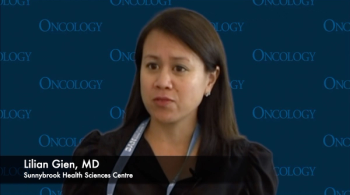
Gynecologic Cancers
Latest News

Latest Videos

CME Content
More News

The FDA has granted mirvetuximab soravtansine-gynx an accelerated approval for the treatment of patients with folate receptor-α-positive platinum-resistant ovarian cancer based on results from the phase 3 SORAYA study.

Jyoti S. Mayadev, MD, indicated that durvalumab (Imfinzi) plus chemotherapy resulted in low rates of high-grade late-onset toxicities in the phase 3 CALLA trial, which may be due in part to the quality of the technology employed during the study.

Jyoti S. Mayadev, MD, indicated that future research for cervical cancer will be focused on combination immune checkpoint inhibitors and biomarker research.

Durvalumab appeared to have no impact on the ability to deliver safe and timely radiation therapy to patients with high-risk locally advanced cervical cancer, according to Jyoti S. Mayadev, MD.

The 12-month progression-free survival rates among patients with high-risk locally advanced cervical cancer were comparable with durvalumab plus chemoradiotherapy vs placebo plus radiotherapy.

Data from the phase 3 CALLA trial indicated that multidisciplinary collaboration and a good quality control strategy are key to providing optimal chemoradiotherapy delivery in locally advanced cervical cancer.

Results from the UK phase 2 PEACOCC trial found improved outcomes with pembrolizumab monotherapy in patients with previously-treated advanced clear cell gynecological cancers.

Ritu Salani, MD, highlights key data from the 2022 ESMO Congress, including those surrounding PARP inhibitor maintenance in advanced ovarian cancer and the latest developments in immunotherapeutics for endometrial and cervical cancer.

Lillian Gien, MD, spoke about continued use of immunotherapy in patients with recurrent clear cell carcinoma of the ovary following results of a trial examining pembrolizumab plus epacadostat.

At 2022 IGCS, Lilian Gien, MD, spoke about a phase 2 trial which analyzed pembrolizumab plus epacadostat in patients with recurrent clear cell carcinoma of the ovary.

Tiffany Sia, MD, spoke about major takeaways from her study and how to implement procedural interventions for patients with gynecologic malignancies who have oligoprogression.

A recent study presented at IGCS 2022 looking at clinical trial enrollment found that Black patients experienced the biggest increase in accrual following an NCI call-to-action for more diversity in clinical trials.

The 24-month follow-up of the phase 1/2 CheckMate 358 trial found nivolumab with or without ipilimumab yielded clinically meaningful, long-lasting responses in patients with recurrent or metastatic cervical cancer.

In a population of patients with cervical intraepithelial neoplasia and stage IA1 cervical cancer, certain local treatments, such as radical excision and ablation, were associated with treatment outcomes and risk of preterm birth.

Investigators reported that vaccinated patients had a higher rate of grade 2/3 cervical neoplasia due to non–vaccine preventable human papillomavirus compared with unvaccinated patients, an event commonly termed clinical unmasking.

Apatinib Plus Pegylated Liposomal Doxorubicin Yields Significant Efficacy in Advanced Ovarian Cancer
Results from the phase 2 APPROVE trial showed apatinib plus pegylated liposomal doxorubicin improved efficacy and safety compared with pegylated liposomal doxorubicin alone for patients with platinum-resistant recurrent ovarian cancer.

Patients with advanced newly diagnosed ovarian, tubal, or peritoneal cancer did not derive further survival benefit from maintenance chemotherapy, although a modest improvement in progression-free survival was observed compared with surveillance.

Nutritional markers such as body mass index, weight loss, and albumin should be assessed to identify pre-operative malnutrition in patients with gynecologic cancers.

Patients with uterine carcinosarcoma who underwent sentinel lymph node biopsy or systemic lymph node dissection did not experience a difference in progression-free survival or overall survival.

Patients with advanced human papillomavirus 16–positive cervical cancer appear to benefit from treatment with VB10.16 and atezolizumab.

The phase 1/2 SPARTACUS trial assessed the use of stereotactic hypofractionated radiation therapy in patients with uterine cancer; the treatment appeared to be well tolerated.

Patients with persistent, recurrent or metastatic cervical cancer whose tumors express PD-L1 can receive treatment with pembrolizumab plus chemotherapy with or without bevacizumab following approval by the European Commission.

The safety and efficacy of NG-641 plus nivolumab will be assessed as part of the phase 1a/b NEBULA trial in patients with previously treated metastatic or advanced epithelial tumor.

Patients with advanced or recurrent uterine serous carcinoma derived promising benefit from treatment with ZN-c3.

Patients with locally advanced cervical cancer did not see further benefit from the addition of concurrent durvalumab to chemoradiotherapy.








































